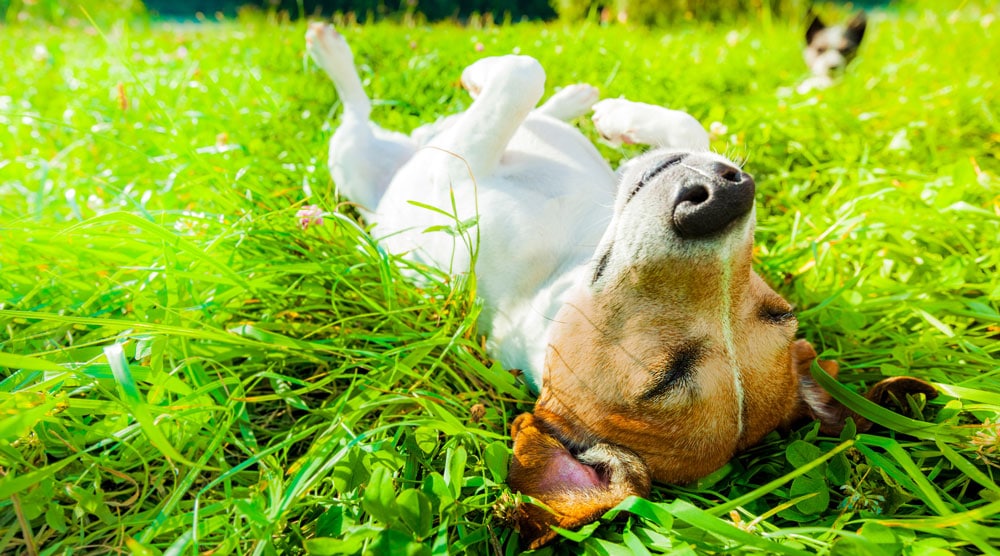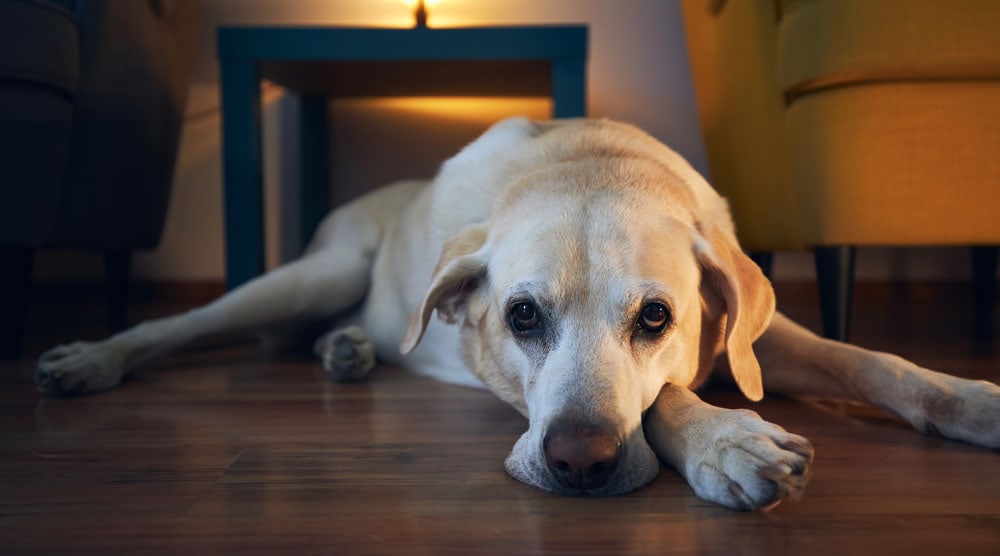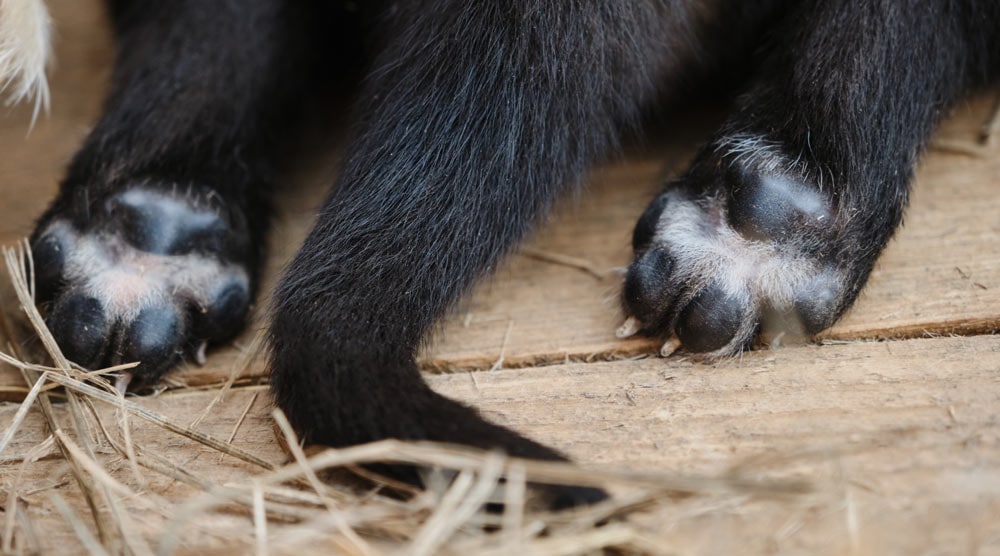Do dogs sleep better in the dark? It’s a good question, as switching off all the lights at bedtime can sometimes feel mean to your dog.
The good news is that most dogs enjoy sleeping in the dark (although there are exceptions). They also tend to fall into a deeper sleep in low-light conditions.
This is partly due to a dog’s circadian rhythm, which is governed by light. Bright light signals the start of the day, and darkness tells the body it’s time for sleep. Dark environments also create a den-like feel that many dogs enjoy.
So, if you’re trying to improve your dog’s sleep, keeping the room dark at night could help. Let’s take a closer look at why most dogs sleep better in the dark – and why some dogs might find it scary.
Contents
Why Most Dogs Sleep Better In The Dark
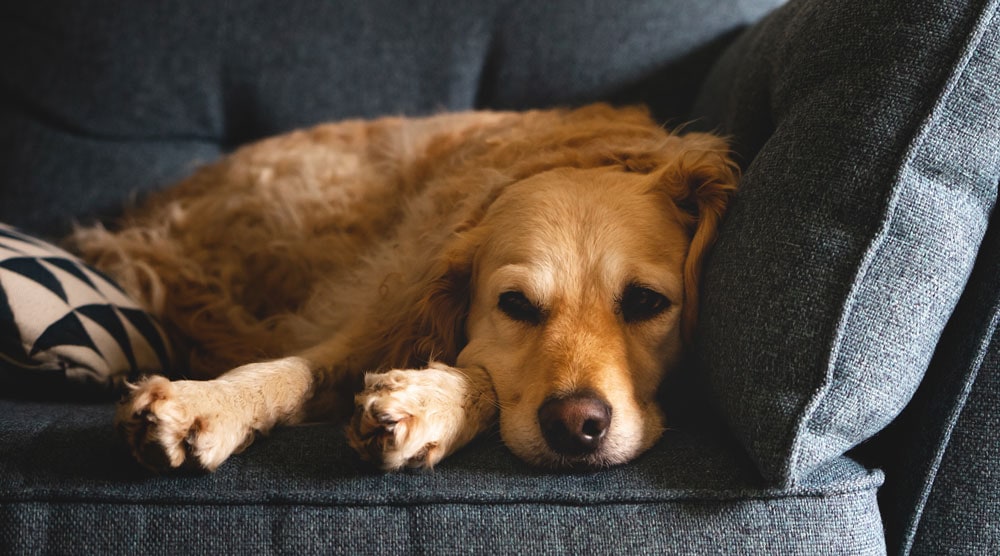
As we’ve mentioned, dogs often sleep better in the dark.
They’ll still nap during the day – adult dogs need an average of 11 hours of sleep per day, and puppies even more – but the most restful sleep comes when it’s dark. Here are three reasons for this.
Dogs Are Den Animals
One reason that dogs sleep better in the dark is that they feel more secure in a low-light environment.
While dogs are domesticated, they retain some instincts of their wild ancestors. In the wild, a dark, covered den would be safer to sleep in than being out in the open. This is also why some dogs like to sleep under a bed or table.
Aside from switching the light off, you can make your dog feel more secure by providing a quiet corner or covered crate to sleep in.
Circadian Rhythm
A dog’s circadian rhythm also plays an important role in sleeping habits.
In all mammals, the circadian rhythm controls the animal’s tendency to act in a certain way depending on the time of the day. This is achieved by altering hormone levels, brain activity, and body temperature throughout the day.
Circadian rhythm evolved in response to the sun rising and setting each day. However, most dogs now live indoors, so they are exposed to artificial light that can interrupt the cycle.
One of the ways you can help your dog get a deeper sleep is to switch the lights off at night. This signals to the brain that it’s time to rest, leading to physiological changes that make it easier for the dog to fall asleep.
Similarly, it’s a good idea to expose your dog to natural sunlight (or bright artificial light) first thing in the morning. This “resets” the circadian rhythm and tells the brain it’s the morning, so that by the time it’s bedtime the body is preparing for rest.
Note: These tips can also help humans improve their sleep quality!
Habit
Habit and consistency are simple reasons why a dog might prefer to sleep in the dark. If you’ve always turned the light off when it’s time to sleep, this has probably become a signal to the dog that it’s time to relax.
Remember that dogs have much better low-light vision than humans (although they can’t see in complete darkness). They also have excellent hearing and sense of smell, so being in the dark is much less disorientating for dogs than it is for humans.

Dogs Are Not Wolves!
There’s a common misconception that dogs should be awake at night because their wolf ancestors are nocturnal animals. This isn’t the case, as domesticated dogs have evolved to match human sleep schedules.
Not All Dogs Enjoy Sleeping In The Dark
It’s true that most dogs sleep better in the dark. But there are also reasons why a dog can become fearful of the dark, or just sleep better with a light on.
The only way to understand how your dog feels about the dark is to watch their behaviour when you turn the light off (assuming there is still enough ambient light to see them!) Here are some signs that they might be uncomfortable in the dark:
- Lip licking
- Vocalisations (including whining or crying)
- Pacing
- Yawning
- Panting
We’ve listed some of the reasons for anxiety around darkness below. For most of these reasons, it’s not the darkness itself that’s the issue, but what the dog associates with darkness.
If your dog doesn’t enjoy the dark, there’s nothing wrong with leaving a light on to make them more comfortable.
Darkness Anxiety
If your dog whines or shows other signs of anxiety when the light is switched off, then they might be afraid of the dark.
However, unlike humans, this is rarely caused by the fear of being unable to see. Dogs have much better night vision than humans, and are more comfortable relying on their other senses.
Instead, they may have associated the light being switched off with being alone.
Anxiety when the light is switched off could also indicate that your dog suffers from separation anxiety. If your dog shows signs of distress whenever you leave (not just at night), then you should contact a canine behaviourist.
Previous Trauma
Bad experiences in the dark could make your dog fearful of the lights being switched off. This is because the darkness triggers memories of the scary event.
For example, a loud thunderstorm or fireworks at night could be traumatic to a dog. Hearing a big argument in the household when it’s dark could also have a similar effect.
In this situation, a nightlight could be an easy way to help your pet feel more comfortable. If they are scared of a particular noise or object, then a canine behaviourist can help you create a desensitisation plan.
Loss of Senses
Dogs naturally have excellent vision in low-light conditions, but they can’t see in full darkness. Age can also dull their senses and make it more difficult to see when the light is switched off.
These changes can make the dark seem scary, rather than comforting. So, if your senior dog is becoming anxious at night, consider leaving a night light on.
Canine Dementia
Canine cognitive dysfunction (CCD), also known as canine dementia, can cause a variety of behaviour changes.
For example, many dogs with CCD sleep more during the day and wake up at night. This isn’t a case of the dog not enjoying the dark, but can have a similar effect on their sleeping schedule.
Additionally, CCD can cause confusion and disorientation. These are often worse in the dark, which may mean that the dog prefers to have a light on at all times.
Aside from a light, you can help your dog by keeping the furniture layout the same, not leaving objects on the floor, and sticking to a routine as much as possible.
Note: It’s important to visit a vet if your senior dog shows signs of CCD. There are many ways to manage the condition and improve your dog’s quality of life.
Why High-Quality Sleep is Important to Dogs
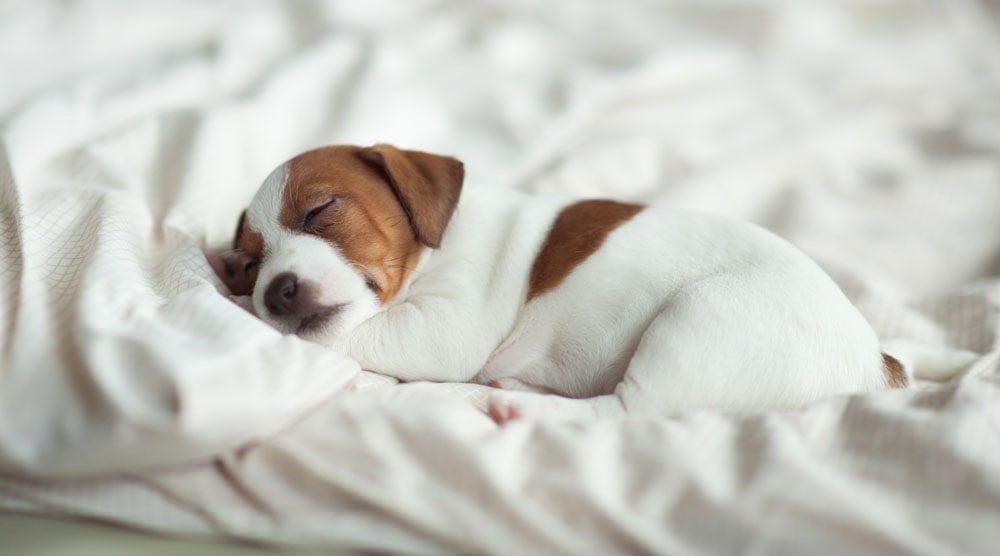
Dogs are adaptable. They can often alter their sleep patterns to match a new routine and environment, making it seem like it doesn’t matter when they sleep.
However, it’s been found that dogs who take short naps during the day, followed by a longer sleep at night, are often happier.
On the other hand, interrupted or inconsistent sleep patterns can lead to a variety of symptoms. These include behaviour changes, irritability, stress, and memory loss. So, it’s important to ensure your dog gets enough restful sleep.
How to Improve Your Dog’s Sleep
There are many ways you can improve your dog’s sleep quality. Here are a few examples that you might want to implement into your pup’s routine:
- Sleep separately from your dog. If your dog is happy to sleep alone, this will probably improve sleep quality for you both. Movement in the bed can disrupt sleep, especially if the dog fears being crushed.
- Stick to a daily routine. A consistent routine helps with your dog’s circadian rhythm. It also teaches your dog when it’s time to relax and rest. Try to walk, feed, and play with your dog at similar times of the day, while maintaining consistent wake-up and bedtimes.
- Block external noises. If your dog is often woken up by noises, consider using a low-level white noise to block these out. Don’t blast your dog with noise though, as they have sensitive hearing.
- Ensure your dog is getting enough exercise. Pent-up frustration and energy can have a huge impact on your dog’s sleep. Make sure you’re providing enough exercise and mental stimulation throughout the day.
- Create a comfortable sleeping environment. This should include a supportive bed, plenty of space, and a quiet location.
- Never disturb your dog while they are sleeping. Being regularly woken up can make it difficult for a dog to relax and sleep deeply. It’s important that everyone in the household follows this rule (especially children).
Summary
Most dogs sleep better when the room is dark. Aside from creating a den-like feel, darkness signals to the brain that it’s time to sleep.
Not all dogs enjoy darkness though. Some dogs may link it with being alone, which can cause anxiety. Previous trauma or certain medical conditions can also make the darkness seem scary.
If your dog doesn’t enjoy sleeping in the dark, then there is nothing wrong with leaving a light on. The most important thing is that they get a relaxing sleep.
Do you have any questions about whether dogs sleep better in the dark? Please let us know in the comments below.

